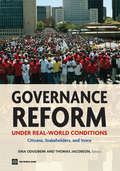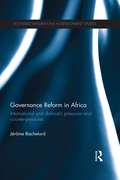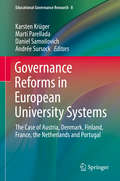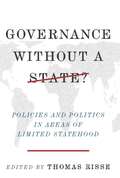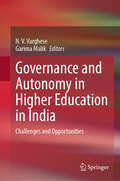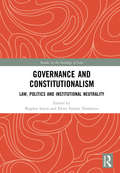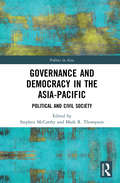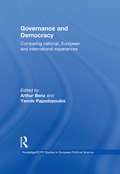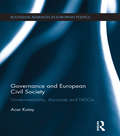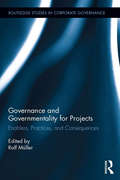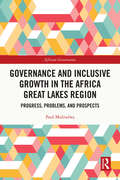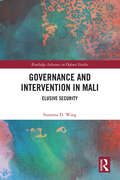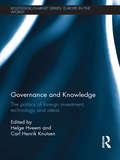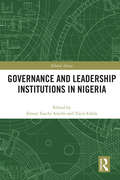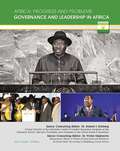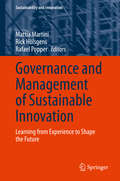- Table View
- List View
Governance Networks in the Public Sector
by Erik Hans Klijn Joop Koppenjan Wouter Spekkink Rianne WarsenGovernance Networks in the Public Sector presents a comprehensive study of governance networks and the management of complexities in network settings. Public, private, and non-profit organisations are increasingly faced with complex, wicked problems when making decisions, developing policies, or delivering services in the public sector. These activities take place in networks of interdependent actors guided by diverging and sometimes conflicting perceptions and strategies. As a result, these networks are dominated by cognitive, strategic, and institutional complexities. Dealing with these complexities requires sophisticated forms of coordination: network management.This book provides a conceptual framework and analytical tools to study the complexities involved in handling wicked problems in governance networks in the public sector. The book also discusses strategies and management recommendations for government, business, and third sector organisations operating in and governing networks. This second edition of the book is a truly revised edition, incorporating recent developments in network governance theory and practice, such as the influences of traditional and social media on network governance processes.This volume is an essential text for advanced students of public management, public administration, public policy, and political science, and for public managers and policymakers.The Open Access version of this book, available at http://www.taylorfrancis.com, has been made available under a Creative Commons Attribution-Non Commercial-No Derivatives (CC BY-NC-ND) 4.0 license.
Governance Reform Under Real-World Conditions: Citizens, Stakeholders, and Voice
by Sina Odugbemi Thomas JacobsonAlthough necessary and often first rate, technocratic solutions alone have been ineffective in delivering real change or lasting results in governance reforms. This is primarily because reform programs are delivered no in controlled environments, but under complex, diverse, sociopolitical and economic conditions. Real-world conditions. In political societies, ownership of reform programs by the entire country cannot be assumed, public opinion will not necessarily be benign, and coalitions of support may be scare or nonexistent, even when intended reforms really will benefit those who need them most. While the development community has the technical tools to address governance challenges, experience shows that technical solutions are often insufficient. Difficulties arise when attempts are made to apply what are often excellent technical solutions. Human beings--either acting alone or in groups small and large--are not as amenable as are pure numbers, and they cannot be ignored. In the real world, reforms will not succeed, and they will certainly not be sustained, without the correct alignment of citizens, stakeholders, and voice. 'Governance Reform under Real-World Conditions: Citizens, Stakeholders, and Voice' is a contribution to efforts to improve governance systems around the world, particularly in developing countries. The contributors, who are academics and development practitioners, provide a range of theoretical frameworks and innovative approaches and techniques for dealing with the most important nontechnical or adaptive challenges that impede the success and sustainability of reform efforts. The editors and contributors hope that this book will be a useful guider for governments, think tanks, civil society organizations, and development agencies working to improve the ways in which governance reforms are implemented around the world.
Governance Reform in Africa: International and Domestic Pressures and Counter-Pressures (Routledge Explorations in Development Studies)
by Jerome BachelardPoor governance is increasingly recognized as the greatest impediment to economic development in Sub-Saharan Africa. Currently, some impressive governance reforms are underway in many countries. This includes cases such as Nigeria – formerly the most corrupt country in the world according to Transparency International. Yet other countries such as Chad are still in reform deadlock. To account for these differences, this book examines governance reform in Sub-Saharan Africa based on an analysis of international and domestic pressures and counter-pressures. It develops a four phase model explaining why governance reforms advance in some instances, whilst in others governance reforms stagnate or even relapse. No study has sought to systematically examine the political forces, both international and domestic, behind the successful conduct of governance reform in Sub-Saharan Africa. Yet, coordination, collaboration and mutual support between international and domestic actors is critical to push individual governments onto the path of reform. This book shows that while international and domestic pro-reform pressures are important, an analysis of anti-reform pressures is also necessary to explain incomplete or failed reform. The main theoretical arguments are structured around four hypotheses. The hypotheses are theoretically generated and tested over four case studies – Madagascar, Kenya, Nigeria and Chad. On this basis, the good governance socialization process is inductively developed in the concluding chapter. This model illustrates how governance practices can evolve positively and negatively in all countries of Sub-Saharan Africa, based on the nature and relative strength of international and domestic pressures and counter-pressures.
Governance Reforms in European University Systems: The Case Of Austria, Denmark, Finland, France, The Netherlands And Portugal (Educational Governance Research Ser. #8)
by Karsten Krüger Martí Parellada Daniel Samoilovich Andrée SursockThis book examines governance reforms in higher education in six European countries: Austria, Denmark, Finland, France, the Netherlands, and Portugal. It focuses in particular on the governance of the systems and institutions in these countries. The book shows that each of the national reform processes has been characterised by its own specific pathways embedded in the country’s specific socio-economic contexts and cultures, but also has a number of features in common with the other countries and processes. The first chapter of the book presents a conceptual framework to analyse the reform processes as an ’implementation game’ played by several actors with diverse interests. The second chapter describes the national reform processes of the six selected countries, giving a voice to the individual university rectors and officials who played an important role during the reform processes. Their stories constitute a vivid narrative of the government drivers of reform and of the rationales of the institutions as main partners in the reform processes. These narratives are analysed, complemented by, and contrasted with a review of the literature on the subject in the third chapter. The final chapter consist of concluding remarks and lessons learned.
Governance Stories (Routledge Advances in European Politics #Vol. 34)
by Mark Bevir Rod RhodesAn incisive examination of Britain today, which breaks from traditional studies, and takes a new approach to account for massive changes in the make-up of the nation. Over the last twenty years Britain has changed from being governed as a unitary state to a country ruled by the interplay of various forces: central government, the market, public-private partnerships, new local government structures (eg. the new Mayoral system), greater regional autonomy as well as the EU and transnational businesses and organizations. In their earlier book Interpreting British Governance, Bevir and Rhodes examined changes in British government by setting out an interpretative approach to British political science, which focussed on an aggregate analysis of British political traditions. This new study builds on this work to: provide a theoretical defence of situated agency located in the historical context of British political science compare their approach to British political science with others including, post-structural and institutional analysis present a general account of governance as the context for ethnographic analyses of governance in action deliver studies of the consumers of public services, the National Health Service, government departments and policy networks. This book will be of great interest to advanced students and researchers of political theory, public policy, British politics and British history.
Governance Without a State? Policies and Politics in Areas of Limited Statehood
by Thomas RisseGovernance discourse in development agencies and the social sciences remains centered on an "ideal type" of modern statehood one that exhibits full internal and external sovereignty and a legitimate monopoly on the use of force. Yet modern statehood remains an anomaly both historically and in the contemporary international system while the condition of "limited statehood " wherein countries lack the capacity to implement central decisions and monopolize force is the norm. Limited statehood argue the authors in this provocative collection is in fact a fundamental form of governance immune to the forces of economic and political modernization ushered in by globalization. Challenging common assumptions about sovereign states and the evolution of modern statehood particularly the dominant paradigms supported by international relations theorists development agencies and international organizations this volume explores strategies for effective and legitimate governance within a framework of weak and ineffective state institutions. Approaching the problem from the perspective of political science history and law contributors explore the factors that contribute to successful governance under conditions of limited statehood such as the involvement of nonstate actors and non-hierarchical modes of political influence. Empirical chapters analyze among other issues security governance by nonstate actors the contribution of public-private partnerships to promote the United Nations Millennium Goals the role of business in environmental governance and the problems of Western state-building efforts. Recognizing these forms of governance as themselves legitimate this collection unravels the complexities of a system that the developed world must negotiate in the coming century.
Governance Without a State?: Policies and Politics in Areas of Limited Statehood (The\art Of The State Ser. #8)
by Ed. Thomas RisseGovernance discourse centers on an "ideal type" of modern statehood that exhibits full internal and external sovereignty and a legitimate monopoly on the use of force. Yet modern statehood is an anomaly, both historically and within the contemporary international system, while the condition of "limited statehood," wherein countries lack the capacity to implement central decisions and monopolize force, is the norm. Limited statehood, argue the authors in this provocative collection, is in fact a fundamental form of governance, immune to the forces of economic and political modernization.Challenging common assumptions about sovereign states and the evolution of modern statehood, particularly the dominant paradigms supported by international relations theorists, development agencies, and international organizations, this volume explores strategies for effective and legitimate governance within a framework of weak and ineffective state institutions. Approaching the problem from the perspectives of political science, history, and law, contributors explore the factors that contribute to successful governance under conditions of limited statehood. These include the involvement of nonstate actors and nonhierarchical modes of political influence. Empirical chapters analyze security governance by nonstate actors, the contribution of public-private partnerships to promote the United Nations Millennium Goals, the role of business in environmental governance, and the problems of Western state-building efforts, among other issues. Recognizing these forms of governance as legitimate, the contributors clarify the complexities of a system the developed world must negotiate in the coming century.
Governance and Autonomy in Higher Education in India: Challenges and Opportunities
by N. V. Varghese Garima MalikThis edited volume explores the changing dynamics of systemic and internal governance in higher education institutions in India. It discusses governance practices for institutions facing extreme challenges in meeting the growing accountability requirements. The book examines governance from a macro standpoint looking at the crisis of the universities and issues in reforming university governance. It uses a microlens to explore flexible learning pathways, academic freedom and institutional governance. It elaborates on topics such as institutional autonomy in higher education, accountability in higher education institutions, the influence of diversity in university functioning, equilibrium in governance, quality in the Indian agricultural university system, leadership in higher education and the effect of financing on institutional governance. By discussing experiences from various international contexts and empirical research, this edited volume brings together the recent policy discourses that greatly influence the higher education systems. This book is of interest to academics, researchers and practitioners working in the governance of higher education.
Governance and Choice of Upper Secondary Education in the Nordic Countries: Access and Fairness (Educational Governance Research #18)
by Annette Rasmussen Marianne DovemarkThis work discusses how the complex relationship between welfare policies of equity and market efficiencies/deficiencies of education policies is handled in local practices. It offers contributions from the five Nordic countries - Norway, Sweden, Denmark, Finland and Iceland - and pays special attention to questions about access and diversity in upper secondary education. The book draws on a wide range of theoretical frameworks and research projects and provides multiple perspectives of how upper secondary staff and students have experienced reforms of education governance during the last two or three decades. The research projects range from in-depth case studies to the analysis of large-scale data sets and inform practitioners, policy makers and researchers about practices of education policy that are highly influenced by market forces.
Governance and Civil Society in Myanmar: Education, Health and Environment (Routledge Contemporary Southeast Asia Series #Vol. 3)
by Helen JamesMost international attention on Myanmar has focused on the political situation, where the military, in power since 1962, continues to refuse to acknowledge the results of democratic elections, and on related human rights issues. This book, by focusing on education, health and environment, and on the institutions which formulate and deliver policy in these fields, shows how the international community can make a significant difference to strengthening Myanmar's civil society and to supporting a future democratic form of government, by encouraging institutional developments in these fields. Such developments in turn, the author argues, will re-skill the younger generation, promote economic development and poverty alleviation, and, through a participatory approach to policy-making, nurture the conditions from which democracy will grow.
Governance and Constitutionalism: Law, Politics and Institutional Neutrality (Studies in the Sociology of Law)
by Bogdan Iancu Elena Simina TănăsescuThis collection studies the rise of neutral bodies as a challenge to the constitutional paradigm of the nation state. Administrative entities such as commissions, agencies, councils, authorities or ‘independent agencies’ as they are sometimes known, are relatively autonomous from majoritarian democratic control and by their institutional design fall outside the classical triad of powers or branches of government. They may even fall outside the confines of the nation state itself as with the EU Commission. The book is divided into theoretical-historical and empirical parts. Part I approaches the phenomenon through the rigorous normative conceptual lens of constitutionalism and constitutional law, questioning the implications of political neutrality on inherited normative categories, both at national and supranational level. Part II comprises case-studies reflecting the full spectrum of theoretical frameworks and concerns developed and explored by the theory-oriented chapters in the first part. The work explores a wide range of issues including the balance between autonomy, legitimacy and accountability, the taxonomy of agencies, the role and limits of expertise as a paramount justification for independence, ‘agentification’ as a result of internationalisation, and ‘agentification’ as a reflex and consequence of transnational polity-building within the EU.
Governance and Democracy in the Asia-Pacific: Political and Civil Society (Politics in Asia)
by Mark R. Thompson Stephen McCarthyThis book explores the theoretical and empirical relationship between democracy and governance in the Asia-Pacific region. Examining a variety of country cases and themes addressing the theoretical tension between governance and democracy, it illuminates how this impacts political and civil societies across the region. Analysing the character, structure and current trajectories of polities in the Asia-Pacific, democratic or otherwise, this book demonstrates that the role of civil society, political society and governance has significantly differed in practice from what has been commonly assumed within the international community. The book includes both theoretical investigations tracing the modern development of the concepts of governance, development and democratization as well as regional and country-specific observations of major issues, presenting comprehensive country-level studies of China, Singapore, Thailand, Cambodia, the Philippines, Myanmar, Fiji and the Solomon Islands. Presenting fascinating insight into non-democratic governance, civil society and the rule of law in illiberal contexts, Governance and Democracy in the Asia-Pacific will prove to be of great use to students and scholars of Asian politics and society, as well as international and comparative politics.
Governance and Democracy: Comparing National, European and International Experiences (Routledge/ECPR Studies in European Political Science #Vol. 44)
by Arthur Benz Yannis PapadopoulosFor the first time, this new collection brings together country specialists, researchers on the European Union, and leading international relations scholars to tackle a crucial question: how compatible are today’s new patterns of ‘policy networks’ and ‘multi-level’ governance with democratic standards? This important question is attracting attention both in political science and in political practices. In political science, the question is mainly dealt with in separated sub-disciplines, which focus on different levels of politics. So far, no serious exchange has actually taken place between authors working on these different levels. The editors of this book – both specialists of network and multi-level governance – show that although the issue is raised differently in the institutional settings of the national state, the European Union, or transnational governance, excellent insights can be gained by comparison across these settings. This major new contribution includes cutting edge work from junior scholars alongside chapters by leading specialists of governance such as Guy Peters, Jon Pierre, Philippe C. Schmitter and Thomas Risse. It also contains a collection of new case studies, theoretical conceptualisations and normative proposals for solutions dealing with the issue of democratic deficits, which all give the reader a better understanding of the most crucial problems and perspectives of democracy in different patterns of "governance" beyond conventional ‘government’ approaches. This is a valuable book for policy analysts, students of the European Union and international relations, and all students in social and political science.
Governance and Environment in Western Europe: Politics, Policy and Administration
by Kenneth Hanf Alf-Inge JansenGovernance and Environment in Western Europe: Politics, Policy and Administration, provides an up-to-date overview of developments in this area focusing on a selection of ten countries in Western Europe and the European Union. The countries examined are: Denmark, France, Germany, Greece, Italy, The Netherlands, Norway, Spain, Sweden and the United Kingdom. The range of countries covered - representing as they do different stages of development in environmental policy, different state and institutional traditions - provides an interesting comparative analysis of how different countries confronting similar problems of environmental management have responded politically and (re)organised their administrative systems for implementing these policies.
Governance and European Civil Society: Governmentality, Discourse and NGOs (Routledge Advances in European Politics)
by Acar KutayThis book provides a critical analysis of the European Union’s approach to ‘governance’, focusing on the way in which civil society is incorporated within the EU decision-making process and arguing that it is not conducive to the democratisation of EU governance. Using a governmentality approach, Kutay demonstrates that civic actors are not incorporated into EU decision-making processes as they are; rather, they are formed, manipulated and guided by political programming. The author explains how this acts to prescribe and construct particular types of subjectivities, thereby limiting and constraining the types of participation that might emerge as part of European civil society and the process of political participation. Governance and European Civil Society will be of interest to students and scholars of European Union politics, global governance, civil society and democracy, Central and East European studies and political and international theory.
Governance and Governmentality for Projects: Enablers, Practices, and Consequences (Routledge Studies in Corporate Governance)
by Ralf MullerThis research-based book takes an organization-wide perspective to describe the governance and governmentality for projects in organizations. Governance of projects defines and directs the ways managers of projects, programs, and project portfolios carry out their work. Governmentality is the way the managers of these managers present themselves to those they lead.Governance and Governmentality for Projects starts with introducing existing theories, models and paradigms for governance and governmentality. It then develops a chronological framework of the ways governance and governmentality for projects is enabled in organizations, how it subsequently unfolds in organizations of different types and sectors, and the consequences of different governance approaches for project results, trust, control, and ethical issues in projects. Special emphasis is given to the link between corporate governance and the governance of project, programs and project portfolios. Three real-life case studies exemplify the research findings described in the book. Through its structure this book describes the development of governance and governmentality in the realm of projects from its organizational origins, via observable practices, to expected consequences of different implementations. Aimed at academics, post-graduate students in business and management, reflective practitioners, standards or policy developers, those in governance roles and others in need of a detailed knowledge of the spectrum of project related governance in organizations, this book will help develop a comprehensive understanding of the theoretical and practical underpinnings of the subject, their interaction, and implications for implementation. This allows for understanding and developing of both generic and idiosyncratic governance structures, such as those needed in project-based organizations.
Governance and Inclusive Growth in the Africa Great Lakes Region: Progress, Problems, and Prospects (African Governance)
by Paul MulindwaThis book provides a comprehensive analysis of the development and governance nexus in Africa’s Great Lakes region. The Great Lakes region continues to experience many challenges, yet much of the literature continues to focus on political governance, leaving behind the socio-economic aspects of the everyday lives of people in the region. This book seeks to bridge this gap in information, considering the social, economic, and cultural dynamics of the population as they inter-play with political discourse as key factors of sustainable development. Drawing on empirical cases and examples from Burundi, Kenya, Rwanda, South Sudan, and Uganda, the book analyses each of the major governance and development issues in Great Lakes region of Africa, including region building and integration, social protection, inter-state relations, democracy and participation, and sustainability. Written by an African scholar with over 20 years of experience of working with indigenous groups in over 34 African countries, this book will be an important read for students and scholars across the fields of international relations, political studies, sustainable development (social and economic), sociology, public policy and management and public administration.
Governance and Intervention in Mali: Elusive Security (Routledge Advances in Defence Studies)
by Susanna D. WingThis book provides the historical and political context for the security interventions in Mali over the past three decades. The work contextualizes external military engagement (including that of the United States, France, the United Nations and G5 Sahel) within the broader framework of weak democratic consolidation, unmet development goals and increasing popular perceptions of widespread corruption in Mali. Over the past three decades, there have been four military coups in Mali: the military coup in 1991 launched the Third Republic; the 2012 coup toppled elected President Touré; the 2020 coup overthrew the elected President Keita; and the coup within a coup that ousted transitional President Bah. Given the political context, how do multiple international interventions relate to insecurity and instability in the country? Drawing on the author’s thirty years of research on Mali, this work examines the relationship between external intervention in the country, domestic actors, and decentralization policies. The book argues that external support has ignored the poor governance that is at the heart of the country’s crises. This book will be of much interest to students of intervention and statebuilding, African politics and International Relations in general.
Governance and Intervention in Mali: Elusive Security (Routledge Advances in Defence Studies)
by Susanna D. WingThis book provides the historical and political context for the security interventions in Mali over the past three decades.The work contextualizes external military engagement (including that of the United States, France, the United Nations and G5 Sahel) within the broader framework of weak democratic consolidation, unmet development goals and increasing popular perceptions of widespread corruption in Mali. Over the past three decades, there have been four military coups in Mali: the military coup in 1991 launched the Third Republic; the 2012 coup toppled elected President Touré; the 2020 coup overthrew the elected President Keita; and the coup within a coup that ousted transitional President Bah. Given the political context, how do multiple international interventions relate to insecurity and instability in the country? Drawing on the author’s thirty years of research on Mali, this work examines the relationship between external intervention in the country, domestic actors, and decentralization policies. The book argues that external support has ignored the poor governance that is at the heart of the country’s crises.This book will be of much interest to students of intervention and statebuilding, African politics and International Relations in general.
Governance and Knowledge: The Politics of Foreign Investment, Technology and Ideas (Routledge/GARNET series)
by Carl Henrik Knutsen Helge HveemThis book examines the politics of technology, and provides a detailed analysis of developments and debates within the European Union, international trade and governance. An important empirical contribution to the literature on the relations between politics and technology, this volume contains empirical statistical studies based on a wide variety of different types of data, and includes expert contributions from different academic disciplines. With a selection of detailed case studies, this book is divided into three main sections: The first part presents contributions on the role of domestic national policies for innovation and idea diffusion, including studies on Japan and the European Union. The second part takes a critical look at how the international system of intellectual property rights access to knowledge, opportunities for development and health improvement, examining the TRIPS agreement and the European patent system. The third part focuses on the role of foreign direct investment in innovation and idea diffusion, with studies on a wide range of cases using different, novel data material. Governance and Knowledge will be of interest to students, scholars and policy-makers of European politics, political economy, international trade, governance and economics.
Governance and Leadership Institutions in Nigeria (Global Africa)
by Ernest Toochi AnicheThis book examines how modern Nigerian political institutions have grappled with the resurgence of traditional institutions of political leadership in the post-colonial era. The contributors examine the role and nature of traditional governance institutions in West Africa from pre-colonial times to the post-colonial era. Part I considers a range of traditional institutions including monarchies, Islamic institutions and the role of culture and arts such as masking and music in traditional leadership. Part II focuses on modern governance institutions, elites, political action, arts, and democracy in post-colonial Nigeria. Part III examines democratic institutions and processes in Nigeria’s Fourth Republic, covering issues such as electoral reforms, women’s political participation, and democratic citizenship. This book will be of interest to students and scholars of African politics, governance, and democratization.
Governance and Leadership in Africa (Africa: Progress and Problems #13)
by Robert I. RotbergMany of the problems in Africa today, including widespread poverty and civil unrest, can be traced to the continents legacy of bad governance. In the post-independence period, authoritarian strongmen took control of many countries, enriching themselves and their cronies by exploiting the peoples labor and their countrys resources. In recent years, however, a growing number of African states have embraced democratic principles and established transparent and open governments. In this book the noted Africa scholar Dr. Robert Rotberg examines the current state of governance and leadership in Africa. He discusses the various types of government found in the continent, clearly showing the correlation between the quality of a countrys leadership and the quality of life enjoyed by that countrys people.
Governance and Management of Sustainable Innovation: Learning from Experience to Shape the Future (Sustainability and Innovation)
by Mattia Martini Rick Hölsgens Rafael PopperSustainable innovation (SI) is considered to be a key driver of societal progress in an era of enormous economic, environmental and societal challenges, and the uncertainties and future consequences that come with them. This book provides evidence, insights and reflections related to specific issues of governance, the management of sustainable innovation and applying a multi-level, multi-stakeholder approach to sustainable innovation analysis. Building on the European Commission (EU) funded research project “Public Participation in Developing a Common Framework for the Assessment and Management of Sustainable innovation” (CASI), it presents tools for assessing and managing sustainable innovation, and reflects on SI-related policies as well as citizens’ aspirations. The book is intended for scholars in the field of sustainable innovation, as well as to policymakers, innovators, students and citizens.
Governance and Performance Management in Public Universities: Current Research and Practice (SIDREA Series in Accounting and Business Administration)
by Eugenio Caperchione Carmine BianchiThis edited volume contributes to the ongoing research and practice on applying performance management to university governance. A comparative approach and international perspective of the issue is provided through extensive use of case studies and empirical findings. A specific focus is also placed on using performance governance applied to higher education institutions' Third Mission, and on enhancing decision makers’ ability to frame dynamic complexity. In this regard, specific attention is devoted to analyzing the cause-and-effect relationships in affecting public outcomes. This also includes managing trade-offs in both time and space, and detecting and counteracting unintended behavioral effects from the use of formal systems focused on quantitative measures for performance assessment.
Governance and Performance in the German Public Research Sector
by Dorothea JansenToday, higher education and research institutions are confronted with variable and sometimes contradictory demands from state, industry and society. They have to face growing volatility in education policy, and a research paradigm that sees an accelerating rate of knowledge growth as well as the internationalization of the knowledge process itself. It is vital that academics and policymakers stay abreast of the impact that policy changes have on education and research in tertiary institutions. Based on a sector-specific theory model for the governance of research organizations, this book outlines evidence of the effects of the so-called 'new public management reforms' in the German university and public research sector. The volume aims to shed some light on the differences between the disciplines in input, throughput, profiles of output and the typical conditions of knowledge production, disparities that are currently little understood and are thus not reflected in government policy as ministers implement new governance forms in the research system. It analyzes in detail these new forms, and demonstrates how they affect knowledge production and research performance from the level of research group up to that of the system itself. The authors focus on a set of disciplines that represent the breadth of research divisions in major universities: natural science fields oriented to basic research (astrophysics), two application-oriented fields from the natural sciences (nanoscience and biotechnology), a social science field (economics) and a humanity field (medieval history).

